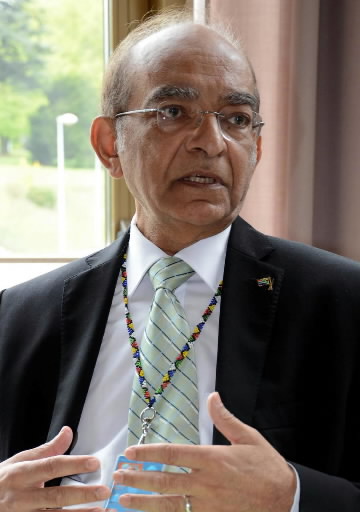Interview with Abdul Samad Minty, South African ambassador: “Missed opportunity” in Japan’s refusal to sign anti-nuclear statement
May 7, 2013
by Michiko Tanaka, Staff Writer
GENEVA--Japan, the nation which suffered the atomic bombings, refused to sign the joint statement on the humanitarian impact of nuclear weapons submitted to the Second Preparatory Committee for the 2015 Nuclear Non-proliferation Treaty (NPT) Review Conference. The Chugoku Shimbun interviewed Abdul Samad Minty, 73, the Permanent Representative of South Africa to the United Nations in Geneva and one of the authors of the statement, on his thoughts concerning Japan’s stance.
How do you feel about the way Japan responded to the statement?
I think it’s extremely regrettable. The statement emphasizes the moral aspect of the use of nuclear weapons. Those who know what happened in Hiroshima and Nagasaki could never oppose such a statement. It’s disappointing that Japan would not sign it because the government viewed it as a political problem. Japan has said that it would like to back the next statement, but we have missed a precious opportunity to urge the nuclear weapon states to make greater efforts for nuclear disarmament.
Japan asked that the expression “under any circumstances” be removed from the language “It is in the interest of the very survival of humanity that nuclear weapons are never used again, under any circumstances.”
I want to ask them what the problem is. Are there any circumstances in which the use of nuclear weapons is justified? Do they mean that nuclear weapons can be used against North Korea? What happened in Hiroshima and Nagasaki must never be repeated.
To encourage more countries to support the statement, the wording about making nuclear weapons illegal was removed, and the document was sent to Japan in advance. Then, only a few hours before the presentation of the statement on April 24, Japan asked for this other change. More than 70 nations had already expressed their agreement. We consulted with Switzerland and the other countries behind the statement, but revising it in this way was difficult.
What are your expectations of Hiroshima?
I visited Hiroshima twice in the 1970s as a member of the African National Congress (ANC), which fought against apartheid and is now the ruling party in South Africa.
I visited Hiroshima Peace Memorial Museum and met with A-bomb survivors in their sickbeds. Hiroshima knows the horror of nuclear weapons firsthand, and I hope Hiroshima will remain a moral leader and persuade the world and the Japanese government to endorse the appeal for nuclear disarmament being made by the supporters of the statement.
(Originally published on April 27, 2013)
GENEVA--Japan, the nation which suffered the atomic bombings, refused to sign the joint statement on the humanitarian impact of nuclear weapons submitted to the Second Preparatory Committee for the 2015 Nuclear Non-proliferation Treaty (NPT) Review Conference. The Chugoku Shimbun interviewed Abdul Samad Minty, 73, the Permanent Representative of South Africa to the United Nations in Geneva and one of the authors of the statement, on his thoughts concerning Japan’s stance.
How do you feel about the way Japan responded to the statement?
I think it’s extremely regrettable. The statement emphasizes the moral aspect of the use of nuclear weapons. Those who know what happened in Hiroshima and Nagasaki could never oppose such a statement. It’s disappointing that Japan would not sign it because the government viewed it as a political problem. Japan has said that it would like to back the next statement, but we have missed a precious opportunity to urge the nuclear weapon states to make greater efforts for nuclear disarmament.
Japan asked that the expression “under any circumstances” be removed from the language “It is in the interest of the very survival of humanity that nuclear weapons are never used again, under any circumstances.”
I want to ask them what the problem is. Are there any circumstances in which the use of nuclear weapons is justified? Do they mean that nuclear weapons can be used against North Korea? What happened in Hiroshima and Nagasaki must never be repeated.
To encourage more countries to support the statement, the wording about making nuclear weapons illegal was removed, and the document was sent to Japan in advance. Then, only a few hours before the presentation of the statement on April 24, Japan asked for this other change. More than 70 nations had already expressed their agreement. We consulted with Switzerland and the other countries behind the statement, but revising it in this way was difficult.
What are your expectations of Hiroshima?
I visited Hiroshima twice in the 1970s as a member of the African National Congress (ANC), which fought against apartheid and is now the ruling party in South Africa.
I visited Hiroshima Peace Memorial Museum and met with A-bomb survivors in their sickbeds. Hiroshima knows the horror of nuclear weapons firsthand, and I hope Hiroshima will remain a moral leader and persuade the world and the Japanese government to endorse the appeal for nuclear disarmament being made by the supporters of the statement.
(Originally published on April 27, 2013)







